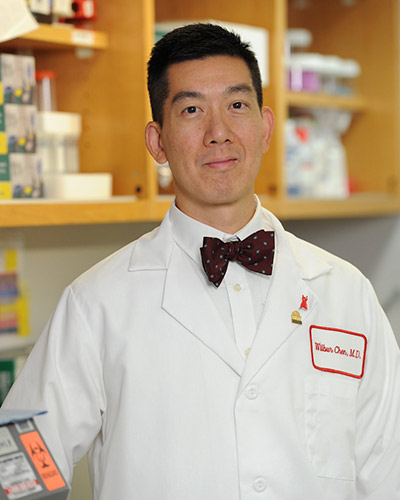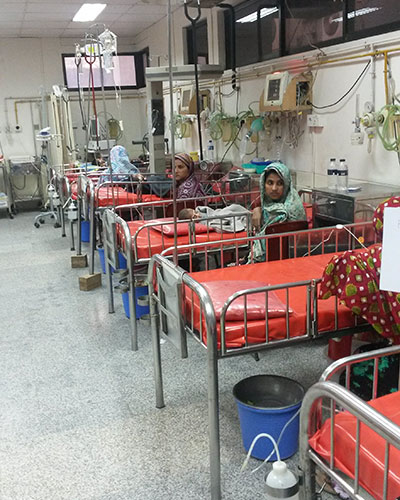October 11, 2017 | Joanne Morrison

Wilbur Chen Recognized for His Work in Infectious Diseases
Wilbur Chen, MD, MS, Associate Professor of Medicine at the University of Maryland School of Medicine (UM SOM), was elected as a Fellow by the Board of Directors of the Infectious Disease Society of America (IDSA). Fellowship in IDSA is a top honor for those who have achieved professional excellence and have provided significant service as an infectious disease physician and scientist.
Dr. Chen is Chief of the Adult Clinical Studies section within UM SOM’s Center for Vaccine Development (CVD) and Director of the UMB Travelers' Health Practice. He is devoted to developing vaccines for enteric pathogens, infectious diseases prevalent in resource-poor and economically disadvantaged countries and populations. Dr. Chen also develops improved vaccines for the elderly, a rapidly growing segment of the global population, which is susceptible to many infections and a special population that generally responds poorly to vaccination.
“Dr. Chen’s contributions in the field of infectious diseases and vaccinology are superb. This recognition is richly deserved,” said Kathleen Neuzil, MD, MPH, FIDSA, Professor of Medicine and Director of the CVD.
Dr. Chen is an active investigator within the CVD’s Vaccine and Treatment Evaluation Unit (VTEU), which is supported by the National Institute of Allergy and Infectious Diseases. Additionally, he has been a principal investigator on vaccine trials for influenza viruses, agents of bioterror and pathogens such as typhoid, cholera and certain E. coli. He has also collaborated on research evaluating Shigella and meningococcal vaccines.
“For more than four decades, the Center for Vaccine Development at the University of Maryland School of Medicine has worked in the U.S. and internationally to develop and ultimately deploy vaccines to aid the world’s underserved. Dr. Chen’s work in vaccine development has been critical toward this goal,” said E. Albert Reece, MD, PhD, MBA, vice president for medical affairs at the University of Maryland and the John Z. and Akiko K. Bowers Distinguished Professor and dean of the University of Maryland School of Medicine.
About the University of Maryland School of Medicine
Commemorating its 210th Anniversary, the University of Maryland School of Medicine was chartered in 1807 as the first public medical school in the United States. It continues today as one of the fastest growing, top-tier biomedical research enterprises in the world -- with 43 academic departments, centers, institutes, and programs; and a faculty of more than 3,000 physicians, scientists, and allied health professionals, including members of the National Academies of Science, Engineering and Medicine, and a distinguished recipient of the Albert E. Lasker Award in Medical Research. With an operating budget of more than $1 billion, the School of Medicine works closely in partnership with the University of Maryland Medical Center and Medical System to provide research-intensive, academic and clinically-based care for more than 1.2 million patients each year. The School has over 2,500 students, residents, and fellows, and nearly $450 million in extramural funding, with more than half of its academic departments ranked in the top 20 among all public medical schools in the nation in research funding. As one of the seven professional schools that make up the University of Maryland, Baltimore campus, the School of Medicine has a total workforce of nearly 7,000 individuals. The combined School and Medical System (“University of Maryland Medicine”) has a total budget of $5 billion and an economic impact of nearly $15 billion on the state and local community. The School of Medicine faculty, which ranks as the 8th-highest public medical school in research productivity, is an innovator in translational medicine with 600 active patents and 24 start-up companies. The School works locally, nationally, and globally, with research and treatment facilities in 36 countries around the world. Visit medschool.umaryland.edu/
About the Center for Vaccine Development
Since its inception in 1974, the CVD has worked to eliminate vaccine-preventable diseases. The CVD has created and tested vaccines against cholera, typhoid fever, paratyphoid fever, non-typhoidal salmonella disease, shigellosis (bacillary dysentery), Escherichia coli diarrhea, nosocomial pathogens, tularemia, influenza, and other infectious diseases. Learn more about the CVD.
Learn More
• Center for Vaccine Development
• Travelers' Health Clinic
• Vaccine Treatment & Evaluation Unit (VTEU)
Contact
Department of Anesthesiology
(410) 328-6120 (phone)
(410) 328-5531 (fax)
swalsh@som.umaryland.edu
University of Maryland School of Medicine
Joanne Morrison
Director of Marketing and Public Relations
University of Maryland School of Medicine
jmorrison@som.umaryland.edu
Office:(410) 706-2884
Mobile:(202) 841-3369
Related stories

Thursday, August 03, 2017
UM SOM Received $2.47 Million Grant To Develop Traveler's Diarrhea Vaccine
The University of Maryland School of Medicine (UM SOM) has been awarded a three-year, $2.47 million grant from the National Institute of Allergy and Infectious Diseases to develop a vaccine to protect against Shigella and Enterotoxigenic Escherichia coli (ETEC), pathogens which are among the leading causes of diarrheal disease in young children in developing countries and a common cause of “traveler’s diarrhea” among travelers to these countries.

Friday, June 10, 2016
FDA Approves Vaccine for Cholera Invented and Developed at University of Maryland School of Medicine
In a milestone that was years in the making, a vaccine to prevent cholera, invented and developed by researchers at the University of Maryland School of Medicine’s Center for Vaccine Development, was approved today by the U.S. Food and Drug Administration (FDA).
